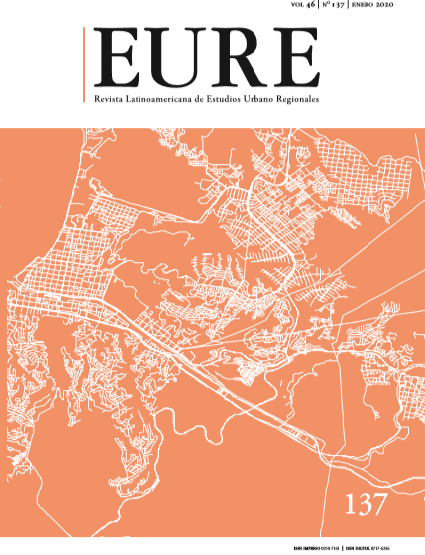A classe trabalhadora e sua relaí§í£o com o território na Espanha durante o regime de Franco. Análise de tríªs modelos contemporí¢neos de organizaí§í£o
DOI:
https://doi.org/10.4067/S0250-71612020000100065Palavras-chave:
assentamentos humanos, história urbana, relaí§í£o campo-cidade.Resumo
A necessidade de organizar a classe operária na Espanha na Espanha de meados do século XX levaria a um intenso período de pesquisa arquitetí´nica e urbana em todos os contextos em que o fení´meno ocorreria: na periferia da cidade industrial, no meio rural e na linha costeira menos estudada. Para divulgar as cidades de férias de Educaí§í£o e Repouso como um sistema organizacional de descanso dos trabalhadores, uma análise comparativa é realizada com outros dois modelos contemporí¢neos, as Í€œvilas dirigidasÍ€ e as Í€œaldeias de colonizaí§í£oÍ€, o que, apesar de suas diferentes abordagens, abordariam um problema semelhante. Para isso, uma série de parí¢metros quantitativos de densidade e usos do solo comuns aos tríªs modelos foram estudados. O texto revela como conclusíµes as particularidades de um modelo organizacional cujas características formais serí£o definitivamente influenciadas por seu destino específico.
Downloads
Publicado
Como Citar
Edição
Seção
Licença
Copyright (c) 2020 Revista EURE - Revista de Estudios Urbano Regionales

Este trabalho está licenciado sob uma licença Creative Commons Attribution 4.0 International License.
Al momento de aceptar la publicación de sus artículos, los autores deberán formalizar la cesión de derechos de autor a EURE, según las condiciones establecidas por la Revista.
Ésta establece que el autor autoriza a EURE de manera gratuita, exclusiva e ilimitada a reproducir, editar, publicar, distribuir, publicitar, comercializar y traducir el artículo, a cualquier soporte conocido o por conocer y desarrollar.
Del mismo modo, los autores aseguran que el artículo propuesto es original, no publicado y no propuesto para tal fin a otro medio de difusión.


